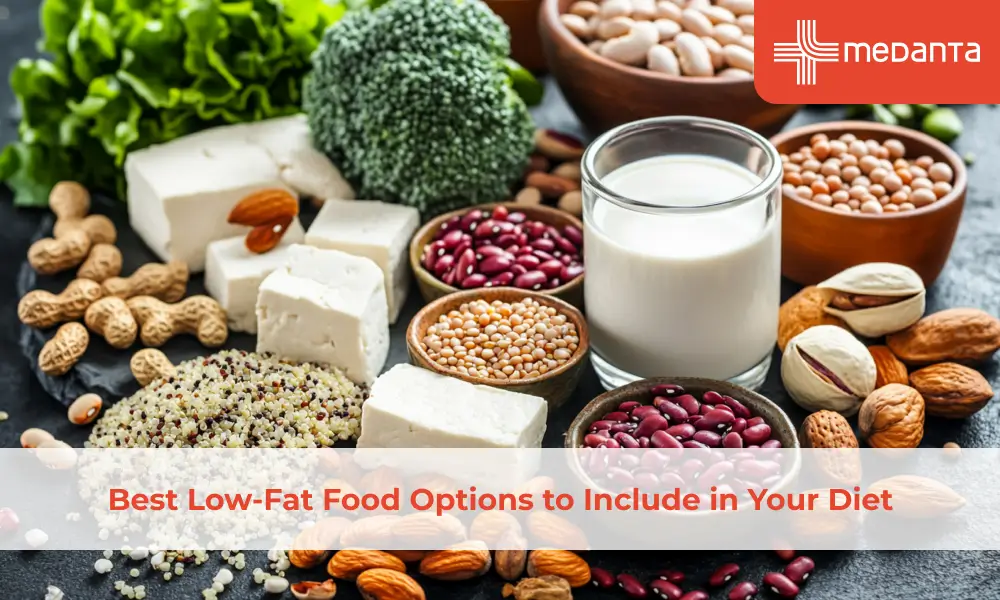Best Low-Fat Food Options to Include in Your Diet

TABLE OF CONTENTS
Introduction
Eating a lot of fat might indeed make you gain weight. However, losing weight requires more than just consuming low-fat meals. Counting calories is another important consideration.
Remember that even if you consume additional calories from low-fat, trans-fat-free, and fat-free meals, your body will still store them as fat. You're more likely to put on weight than lose it if you swap high-fat items for high-calorie ones like desserts.
You must expend more calories than you intake to lose weight. You may do this by increasing your physical activity levels and consuming fewer calories and fats. When examining food labels, a thumb rule is to look for products with 3 grams of fat or less for every 100 calories. Thus, the percentage of calories from fat must be below 30%.
To be considered "light," a product must contain half or less of the fat found in the conventional form. Margarine, mayonnaise, and various salad dressings are examples of such foods. These foods do not have to contain less than 30% fat to be considered low-fat.
Best Low-Fat Food Options to Include in Your Diet
Leafy vegetables: Leafy greens are practically fat-free and rich in calcium, potassium, folate, vitamins A and K, and other healthy minerals. They are particularly abundant in plant substances that have been found to lower inflammation in the body.
Fruits: If you're searching for a sweet, low-fat snack, fruit is a great choice. Just about all fruits are abundant in vitamins, minerals, and fibre and low in fat. Additionally, they contain a lot of plant chemicals. In actuality, many of these advantageous plant substances are what give fruits their vivid hues. Furthermore, several plant components are well recognised to be powerful antioxidants.
Legumes & Beans: Beans, peas, and lentils are included in the group of vegetables known as legumes, commonly referred to as pulses. They don't have any cholesterol and have little fat. Additionally, they include a lot of fibre, protein, B vitamins, and important minerals including magnesium, zinc, and iron.
Sweet potatoes: Sweet potatoes are a filling, low-fat root crop. Only 1.4 grams of fat are found in one medium sweet potato. Sweet potatoes include vitamin A, vitamin C, and several vitamins B in addition to being low in fat. They are also abundant in minerals like manganese and potassium.
Cruciferous Vegetables: Cruciferous vegetables are a rich source of vitamins C, E, and K as well as fibre, folate, various minerals, and other nutrients. Broccoli, cauliflower, Brussels sprouts, cabbage, bok choy, and turnips are among typical cruciferous vegetables. These veggies are all essentially fat-free, making them a great compliment to a diet low in fat.
Garlic: Garlic is a well-liked component due to its strong flavour and scent. Additionally, it contains nearly no fat and relatively few calories. Garlic has been utilised as medicine for a very long time. When frequently ingested, research suggests that garlic may strengthen your immune system and help you avoid the common cold.
White, lean fish: Cod, perch, pollock, and haddock are some examples of white, lean fish. These fish varieties are a great source of excellent protein and are low in calories and fat.
Chicken Breast: One serving of chicken breast, a popular low-fat cuisine, delivers a significant quantity of high-quality protein. Roasted, skinless chicken breast weighs 3 ounces 85 grams and has 26 grams of protein but just 3 grams of fat.
Low-Fat Dairy: Dairy products with reduced fat content include low-fat yoghurt and cottage cheese as well as skim or fat-free milk. Dairy products are generally regarded as great providers of protein, and several minerals, including the B vitamins niacin, riboflavin, B6, and B12.
Conclusion:
Adopting a low-fat diet could be a beneficial strategy for promoting healthy eating. It is essential to continue consuming healthy fats, like those found in fish, avocados, and nuts. However, cutting out unhealthy fats can improve a person's weight, heart health, and general well-being. A person should see their doctor if they have any queries about the kind of food they should consume for their health.






